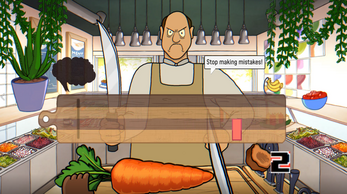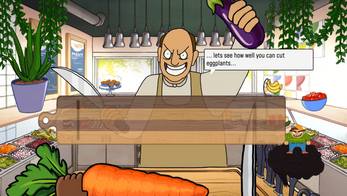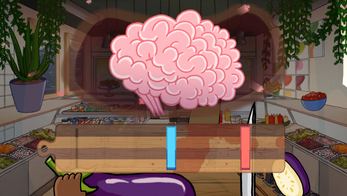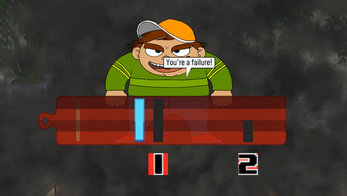Wittle
Depression is a serious mood disorder that affects more than 300 million people worldwide, an increase of over 18% in the last decade. Its rise in Canada has been attributed to an increased level of stress and anxiety among young people, particularly in light of high student debt, uncertain employment climates and extremely high housing prices. Depression is typically treated with a combination of SSRI or SNRI drugs & Cognitive Behavior Therapy (CBT). Patients often choose to reduce their depression symptoms by adjusting their thought & behavior patterns (as prescribed by CBT), in order to avoid the negative side effects of the drugs. While practitioners have been trying to get patients to adopt to CBT, it comes with many challenges. Thus we wanted to develop a video game that would make it easier, more accessible and more fun for people to practice these skills.
Wittle as its core is about opening up the conversation about mental health and how it affects people differently. We wanted to create a highly accessible training game that will make practicing CBT skills more enjoyable, aiming to improve results. In this way, we can provide solutions to thought traps in the form of escape strategies, and we can communicate these solutions in a uniquely approachable, enjoyable way. Wittle is not therapy and cannot replace a real therapeutic relationship. Instead, Wittle will supplement a therapeutic relationship by providing an opportunity to practice CBT skills while fostering a sense of kinship with others facing the same fight. It harbors its stories from real life testimonies of people who have dealt with depression and other mental health issues, and how they have managed to overcome the obstacles they’ve face in life.
Unlike video games of this nature, Wittle takes real testimonials and turns them into interactive play. Drawing directly on the lived experience of performers, each game level clearly investigates one thought trap, and invites the player to challenge it. In addition to integrating CBT and exposing players to real-life experiences, Wittle has a secret weapon: laughs. Wittle uses humour as a crucial element in the transmission of information about mental health.
For this project, we have consulted with experts in the field of mental health to give us greater insight about the topic alongside intensive research we have conducted. In that sense, we gage in how to integrate the real life experiences of people within a game that allows for enough room to let players engage with the content and feel strong connections to the characters they play as. At the same time, game mechanics as well must be accessible for all ages and enough to keep them immersed. With that in mind, for this prototype we added a feature where you can adjust the level of difficulty. What makes it unique is that players can also change the level of negativity within the game, allowing people to minimize or maximize the challenges through each stage. Ultimately with Wittle, we want to bring forth the possibility of using videos games as a channel for health-related changes and improvements as it is a large entertainment format that provides player involvement for all ages.
| Status | Prototype |
| Platforms | HTML5, Windows |
| Author | Embreate |
| Made with | Unity |
| Tags | 2D, Arcade, Casual, Food, Mental Health, Narrative, Singleplayer |
| Average session | A few minutes |
| Languages | English |
| Inputs | Mouse |
| Accessibility | One button |



